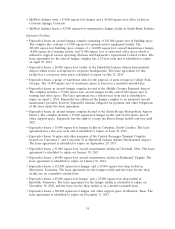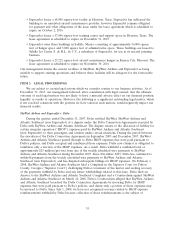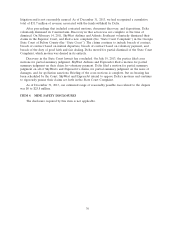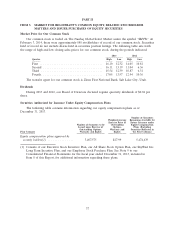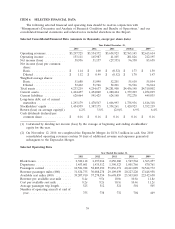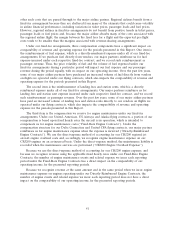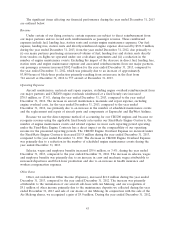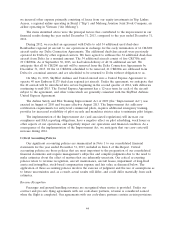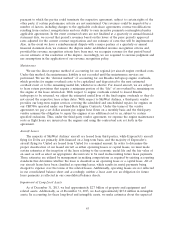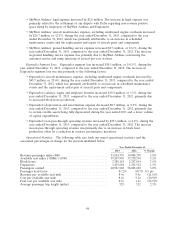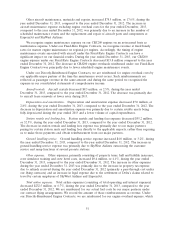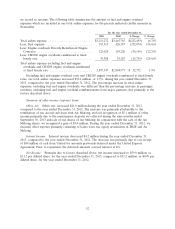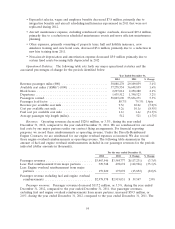SkyWest Airlines 2013 Annual Report Download - page 49
Download and view the complete annual report
Please find page 49 of the 2013 SkyWest Airlines annual report below. You can navigate through the pages in the report by either clicking on the pages listed below, or by using the keyword search tool below to find specific information within the annual report.we incurred other expense primarily consisting of losses from our equity investments in Trip Linhas
Aereas, a regional airline operating in Brazil (‘‘Trip’’) and Mekong Aviation Joint Stock Company, an
airline operating in Vietnam (‘‘Air Mekong’’).
The items identified above were the principal factors that contributed to the improvement in our
financial results during the year ended December 31, 2013, compared to the year ended December 31,
2012.
During 2012, we reached an agreement with Delta to add 34 additional used dual-class
Bombardier regional jet aircraft to our operations in exchange for the early termination of 66 CRJ200
aircraft under our Delta Connection Agreements. The additional dual-class aircraft were previously
operated for Delta by other regional carriers. We have agreed to sublease the 34 additional dual-class
aircraft from Delta for a nominal amount. The 34 additional aircraft consist of five CRJ700s and
29 CRJ900s. As of September 30, 2013, we had taken delivery of all 34 additional aircraft. We
anticipate that all 66 CRJ200 aircraft will be removed from the Delta Connection Agreements by
December 31, 2015. Of the 66 CRJ200s scheduled to be removed, 41 CRJ200s are subleased from
Delta for a nominal amount, and are scheduled to be returned to Delta without obligation to us.
On May 16, 2013, SkyWest Airlines and United entered into a United Express Agreement to
operate 40 new Embraer E175 dual-class regional jet aircraft. Under the agreement, we anticipate that
the 40 aircraft will be introduced into service beginning in the second quarter of 2014, with deliveries
continuing to mid-2015. The United Express Agreement has a 12-year term for each of the aircraft
subject to the agreement, and other terms which are generally consistent with the SkyWest Airlines
United Express Agreement.
The Airline Safety and Pilot Training Improvement Act of 2009 (the ‘‘Improvement Act’’) was
enacted in August of 2010 and became effective August 2013. The Improvement Act adds new
certification requirements for entry-level commercial pilots, requires additional emergency training,
provides for increased availability of pilot records and mandates stricter rules to minimize pilot fatigue.
The implementation of the Improvement Act (and associated regulations) will increase our
compliance and FAA reporting obligations, have a negative effect on pilot scheduling, work hours or
other aspects of our operations, and negatively impact our operations and financial condition. As a
consequence of the implementation of the Improvement Act, we anticipate that our crew costs will
increase during 2014.
Critical Accounting Policies
Our significant accounting policies are summarized in Note 1 to our consolidated financial
statements for the year ended December 31, 2013, included in Item 8 of this Report. Critical
accounting policies are those policies that are most important to the preparation of our consolidated
financial statements and require management’s subjective and complex judgments due to the need to
make estimates about the effect of matters that are inherently uncertain. Our critical accounting
policies relate to revenue recognition, aircraft maintenance, aircraft leases, impairment of long-lived
assets and intangibles, stock-based compensation expense and fair value as discussed below. The
application of these accounting policies involves the exercise of judgment and the use of assumptions as
to future uncertainties and, as a result, actual results will differ, and could differ materially from such
estimates.
Revenue Recognition
Passenger and ground handling revenues are recognized when service is provided. Under our
contract and pro-rate flying agreements with our code-share partners, revenue is considered earned
when the flight is completed. Our agreements with our code-share partners contain certain provisions
44


